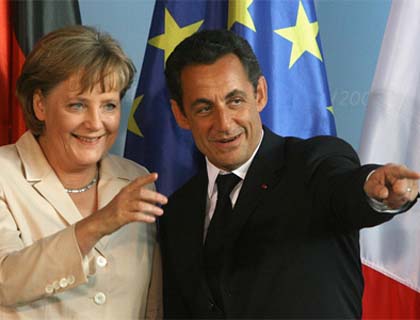BERLIN — the leaders of France and Germany said boosting economic growth across Europe is a priority in their efforts to stem the debt crisis that is showing signs of spreading across the 17 countries that use the euro.
Following a meeting in Berlin Monday with French President Nicolas Sarkozy, German Chancellor Angela Merkel also urged Greece and its private creditors to quickly agree the restructuring of the country's national debt if it is to receive its next batch of bailout cash. In October, the eurozone agreed a second handout for Greece that involves the country's private creditors accepting a 50 percent reduction in the value of their holdings of Greek debt.
She added that both she and Sarkozy want Greece to receive the money.
"We want for Greece to remain in the eurozone," Merkel said.
The two leaders also said they would consider speeding up payments into the 17-nation eurozone's permanent rescue fund, the European Stability Mechanism, in an effort to bolster confidence, and for a quick conclusion to negotiations on a new treaty enshrining fiscal rules.
Germany has insisted on austerity measures in the so-called eurozone's fight to lower budget deficits and regain investor confidence. Europe is working to hammer out a new treaty enshrining tougher fiscal rules, which leaders agreed at a summit in early December.
Merkel added that resolving the crisis will be "step-by-step ... there's no single-dimension solution."
They also told reporters that Europe should compare countries' labor market practices and learn from the best, and for European funds to be used in a way that could create jobs.
The French and German leaders are working to draw up new budget and fiscal guidelines by March to help contain a debt crisis that threatens to engulf the eurozone.
Greece, whose sovereign debt problems sparked the current crisis, is struggling top impose austerity measures to ensure that it secures a second, euro130 billion ($165 billion) bailout to ensure that it does not default on its debt and remain in eurozone. Greek Prime Minister Lucas Papademos warned union leaders and business groups last week that decisions made in the next few weeks, ahead of a new visit by international debt inspectors, will determine the country's future in Europe.
Greece is also working to strike a deal with creditors for the 50 percent reduction in their holdings of Greek debt to try to put the country back on its feet.
Monday's meeting of Merkel and Sarkozy comes ahead of new Italian Premier Mario Monti's first visit to Berlin Wednesday.
Merkel spokesman Seibert said the chancellor plans an "informal" meeting in Berlin Tuesday evening with IMF chief Christine Lagarde.
Merkel and Sarkozy will travel to Italy on Jan. 20 before a European summit at the end of the month.
Italy is a key focus of the crisis because of its size, huge debt load and need to borrow heavily in the first quarter. The yield on its 10-year bonds is hovering around the 7 percent level that is widely-considered to be a danger mark.
The push to secure a future for the eurozone comes amid hopes that some parts of Europe might avoid a recession this year.
International Monetary Fund Managing Director Christine Lagarde told reporters on Business Day over the weekend that there was reason to be "a bit more upbeat" about prospects for the region.
Lagarde's remarks were in marked contrast to her downbeat tone last month, when she warned the world economy was "in a dangerous situation".
"The eurozone scene has changed massively over the last 18 months or so there are reasons to be a little bit more upbeat about the prospects," she told Business Week.
Germany's reputation as a safe haven from the sovereign debt crisis was bolstered on Monday with the sale of 3.9 billion euros of six-month treasury bills at a yield of minus 0.0122 percent. (AP)

